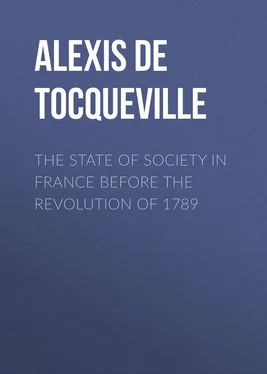Alexis de Tocqueville - The State of Society in France Before the Revolution of 1789
Здесь есть возможность читать онлайн «Alexis de Tocqueville - The State of Society in France Before the Revolution of 1789» — ознакомительный отрывок электронной книги совершенно бесплатно, а после прочтения отрывка купить полную версию. В некоторых случаях можно слушать аудио, скачать через торрент в формате fb2 и присутствует краткое содержание. Жанр: foreign_prose, История, foreign_edu, foreign_antique, на английском языке. Описание произведения, (предисловие) а так же отзывы посетителей доступны на портале библиотеки ЛибКат.
- Название:The State of Society in France Before the Revolution of 1789
- Автор:
- Жанр:
- Год:неизвестен
- ISBN:нет данных
- Рейтинг книги:3 / 5. Голосов: 1
-
Избранное:Добавить в избранное
- Отзывы:
-
Ваша оценка:
- 60
- 1
- 2
- 3
- 4
- 5
The State of Society in France Before the Revolution of 1789: краткое содержание, описание и аннотация
Предлагаем к чтению аннотацию, описание, краткое содержание или предисловие (зависит от того, что написал сам автор книги «The State of Society in France Before the Revolution of 1789»). Если вы не нашли необходимую информацию о книге — напишите в комментариях, мы постараемся отыскать её.
The State of Society in France Before the Revolution of 1789 — читать онлайн ознакомительный отрывок
Ниже представлен текст книги, разбитый по страницам. Система сохранения места последней прочитанной страницы, позволяет с удобством читать онлайн бесплатно книгу «The State of Society in France Before the Revolution of 1789», без необходимости каждый раз заново искать на чём Вы остановились. Поставьте закладку, и сможете в любой момент перейти на страницу, на которой закончили чтение.
Интервал:
Закладка:
The Central Government alone undertook, with the help of its agents, to maintain public order in the provinces. The maréchaussée , or mounted police, was dispersed in small detachments over the whole surface of the kingdom, and was everywhere placed under the control of the Intendants. It was by the help of these soldiers, and, if necessary, of regular troops, that the Intendant warded off any sudden danger, arrested vagabonds, repressed mendicity, and put down the riots, which were continually arising from the price of corn. It never happened, as had been formerly the case, that the subjects of the Crown were called upon to aid the Government in this task, except indeed in the towns, where there was generally a town-guard, the soldiers of which were chosen and the officers appointed by the Intendant.
The judicial bodies had preserved the right of making police regulations, and frequently exercised it; but these regulations were only applicable to a part of the territory, and, more generally, to one spot only. The Council had the power of annulling them, and frequently did annul them in cases of subordinate jurisdiction. But the Council was perpetually making general regulations applicable to all parts of the kingdom, either relative to subjects different from those which the tribunals had already settled, or applicable to those which they had settled in another manner. The number of these regulations, or arrêts du Conseil , as they were then called, was immense; and they seem to have constantly increased the nearer we approach the Revolution. There is scarcely a single matter of social economy or political organisation that was not reorganised by these arrêts du Conseil during the forty years preceding that event.
Under the ancient feudal state of society, the lord of the soil, if he possessed important rights, had, at the same time, very heavy obligations. It was his duty to succour the indigent in the interior of his domains. The last trace of this old European legislation is to be found in the Prussian Code of 1795, which says, ‘The lord of the soil must see that the indigent peasants receive an education. It is his duty to provide means of subsistence to those of his vassals who possess no land, as far as he is able. If any of them fall into want, he must come to their assistance.’
But no law of the kind had existed in France for a long time. The lord, when deprived of his former power, considered himself liberated from his former obligations; and no local authority, no council, no provincial or parochial association, had taken his place. No single being was any longer compelled by law to take care of the poor in the rural districts, and the Central Government had boldly undertaken to provide for their wants by its own resources.
Every year the Council assigned to each province certain funds derived from the general produce of the taxes, which the Intendant distributed for the relief of the poor in the different parishes. It was to him that the indigent labourer had to apply, and, in times of scarcity, it was he who caused corn or rice to be distributed among the people. The Council annually issued ordinances for the establishment of charitable workshops ( ateliers de charité ) where the poorer among the peasantry were enabled to find work at low wages, and the Council took upon itself to determine the places where these were necessary. It may be easily supposed, that alms thus bestowed from a distance were indiscriminate, capricious, and always very inadequate. 19 19 See Note XV., Public Relief, and Note XVI.
The Central Government, moreover, did not confine itself to relieving the peasantry in time of distress; it also undertook to teach them the art of enriching themselves, encouraged them in this task, and forced them to it, if necessary. 20 20 See Note XVII., Powers of the Intendant for the Regulation of Trade.
For this purpose, from time to time, it caused distributions of small pamphlets upon the science of agriculture to be made by its Intendants and their Sub-delegates, founded schools of agriculture, offered prizes, and kept up, at a great expense, nursery-grounds, of which it distributed the produce. It would seem to have been more wise to have lightened the weight and modified the inequality of the burdens which then oppressed the agriculture of the country, but such an idea never seems to have occurred.
Sometimes the Council insisted upon compelling individuals to prosper, whether they would or no. The ordinances constraining artisans to use certain methods and manufacture certain articles are innumerable; and as the Intendants had not time to superintend the application of all these regulations, there were inspectors-general of manufactures, who visited in the provinces to insist on their fulfilment. Some of the arrêts du Conseil even prohibited the cultivation of certain crops which the Council did not consider proper for the purpose; whilst others ordered the destruction of such vines as had been, according to its opinion, planted in an unfavourable soil. So completely had the Government already changed its duty as a sovereign into that of a guardian.
CHAPTER III
In France municipal freedom outlived the feudal system. Long after the landlords were no longer the rulers of the country districts, the towns still retained the right of self-government. Some of the towns of France continued down to nearly the close of the seventeenth century to form, as it were, small democratic commonwealths, in which the magistrates were freely elected by the whole people and were responsible to the people—in which municipal life was still public and animated—in which the city was still proud of her rights and jealous of her independence.
These elections were generally abolished for the first time in 1692. The municipal offices were then what was called put up to sale ( mises en offices was the technical expression), that is to say, the King sold in each town to some of the inhabitants the right of perpetually governing all their townsmen.
This measure cost the towns at once their freedom and their well-being; for if the practice of the sale of commissions for a public employment sometimes proved useful in its effects when applied to the courts of justice—since the first condition of the good administration of justice is the complete independence of the judge—this system never failed to be extremely mischievous whenever it was applied to posts of administrative duty, which demand, above all things, responsibility, subordination, and zeal. The Government of the old French monarchy was perfectly aware of the real effects of such a system. It took great care not to adopt for itself the same mode of proceeding which it applied to the towns, and scrupulously abstained from putting up to sale the commissions of its own Intendants and Sub-delegates.
And it well deserves the whole scorn of history that this great change was accomplished without any political motive. Louis XI. had curtailed the municipal liberties of the towns, because he was alarmed by their democratic character; 21 21 See Note XVIII., Spirit of the Government of Louis XI.
Louis XIV. destroyed them under no such fears. The proof is that he restored these rights to all the towns which were rich enough to buy them back again. In reality, his object was not to abolish them, but to traffic in them; and if they were actually abolished, it was, without meaning it, by a mere fiscal expedient. The same thing was carried on for more than eighty years. Seven times within that period the Crown resold to the towns the right of electing their magistrates, and as soon as they had once more tasted this blessing, it was snatched away to be sold to them once more. The motive of the measure was always the same, and frequently avowed. ‘Our financial necessities,’ says the preamble to an edict of 1722, ‘compel us to have recourse to the most effectual means of relieving them.’ The mode was effectual, but it was ruinous to those who bore this strange impost. ‘I am struck with the enormity of the sums which have been paid at all times to purchase back the municipal offices,’ writes an Intendant to the Comptroller-General in 1764. ‘The amount of these sums spent in useful improvements would have turned to the advantage of the town, which has, on the contrary, felt nothing but the weight of authority and the privileges of these offices.’ I have not detected a more shameful feature in the whole aspect of the government of France before the Revolution.
Интервал:
Закладка:
Похожие книги на «The State of Society in France Before the Revolution of 1789»
Представляем Вашему вниманию похожие книги на «The State of Society in France Before the Revolution of 1789» списком для выбора. Мы отобрали схожую по названию и смыслу литературу в надежде предоставить читателям больше вариантов отыскать новые, интересные, ещё непрочитанные произведения.
Обсуждение, отзывы о книге «The State of Society in France Before the Revolution of 1789» и просто собственные мнения читателей. Оставьте ваши комментарии, напишите, что Вы думаете о произведении, его смысле или главных героях. Укажите что конкретно понравилось, а что нет, и почему Вы так считаете.












